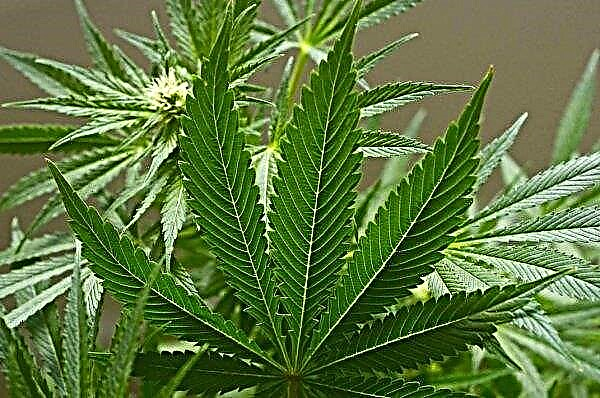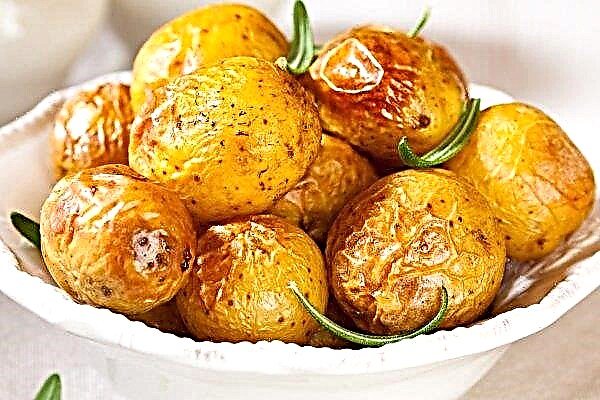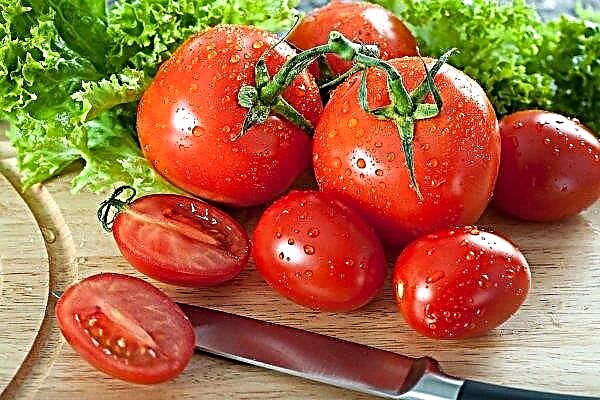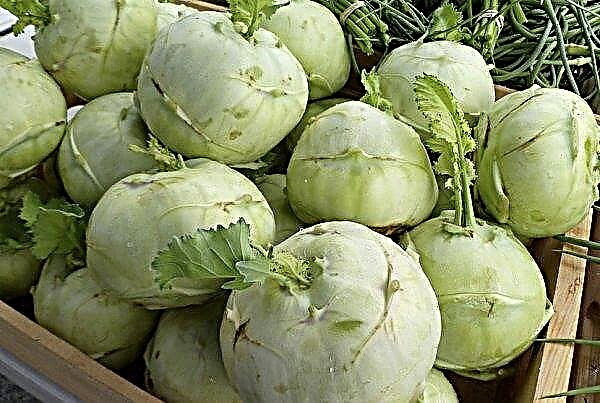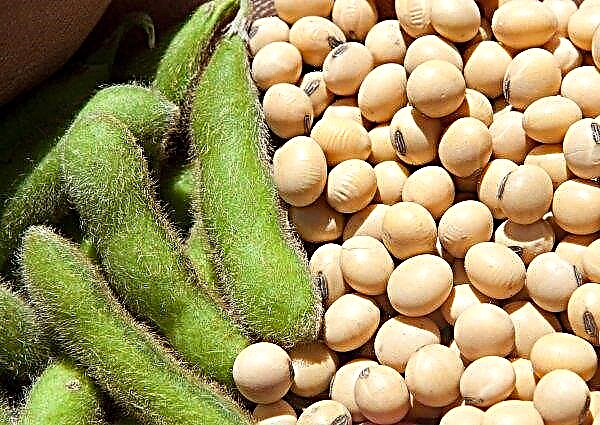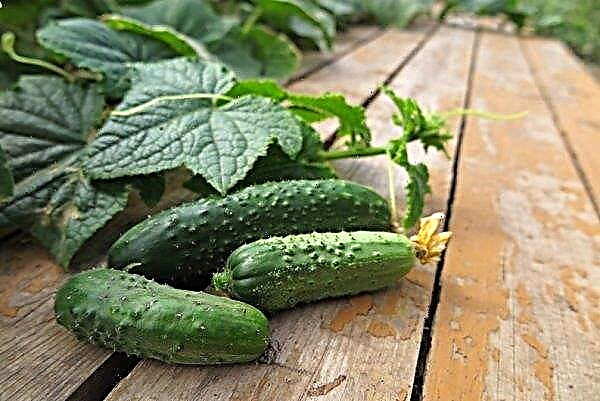On store shelves and in recipes most often appear three types of onions - leek, onion and green. In the article, we consider their composition, useful properties, rules for use and contraindications.
Mineral and Vitamin Composition
Leek, onion and its green feather have a somewhat similar, but not the same composition. Next, we will analyze the vitamins and minerals contained in 100 g of the product, as well as find out which types include most of all ascorbic acid (vitamin C).

Leek
100 g of leek contains such vitamins:
- A - 0.333 mg;
- beta-carotene - 2 mg;
- B1 - 0.01 mg;
- B2 - 0.04 mg;
- B4 - 9.5 mg;
- B5 - 0.12 mg;
- B6 - 0.3 mg;
- B9 - 0.032 mg;
- C - 35 mg;
- E - 0.8 mg;
- H - 1.4 μg;
- K - 0.047 mcg;
- PP - 0.8 mg;
- niacin - 0.5 mg.
Did you know? Leek is unique in that when stored in its white part, the concentration of vitamin C increases (1.5 times). Other vegetables do not have this quality.
The mineral content in 100 g of leek:
- potassium - 225 mg;
- calcium - 87 mg;
- silicon - 35 mg;
- magnesium - 10 mg;
- sodium - 50 mg;
- sulfur - 37 mg;
- phosphorus - 58 mg;
- chlorine - 20.8 mg;
- aluminum - 0.0221 kg;
- boron - 0.0244 mg;
- vanadium - 0.0068 mg;
- iron - 1.0 mg;
- iodine - 0.4 mcg;
- cobalt - 0.0026 mcg;
- lithium - 0.4 mcg;
- Manganese - 0.48 mg;
- copper - 0.12 mg;
- molybdenum - 1.6 mcg;
- nickel - 1.5 mcg;
- rubidium - 4.8 mcg;
- selenium - 0.558 mcg;
- strontium - 8.4 mcg;
- fluorine - 0.014 mg;
- chromium - 0.8 mcg;
- zinc - 0.11 mg.

Onion
The following vitamins are found in 100 grams of onions:
- beta-carotene - 0.001 mg;
- lutein and zeaxanthin - 4 mcg;
- B1 - 0.046 mg;
- B2 - 0.027 mg;
- B4 - 6.1 mg;
- B5 - 0.123 mg;
- B6 - 0.12 mg;
- B9 - 0.019 mg;
- C 7.4 mg;
- E - 0.02 mg;
- K - 0.4 μg;
- PP - 0.116 mg;
- betaine - 0.1 mg.
In 100 g of the product there are such macro- and microelements:
- potassium - 146 mg;
- calcium - 23 mg;
- magnesium - 10 mg;
- sodium - 4 mg;
- phosphorus - 29 mg;
- iron - 0.21 mg;
- Manganese - 0.129 mg;
- copper - 0.39 mg;
- selenium - 0.5 mcg;
- fluorine - 1.1 mcg;
- zinc - 0.17 mg.

Green onions
100 g of green onion (feather) contains the following vitamins:
- A - 0.333 mg;
- beta-carotene - 0.002 mg;
- B1 - 0.02 mg;
- B2 - 0.01 mg;
- B4 - 4.6 mg;
- B5 - 0.13 mg;
- B6 - 0.15 mg;
- B9 - 0.018 mg;
- C - 30 mg;
- E - 1 mg;
- K - 0.4 μg;
- H - 0.9 mcg;
- PP - 0.5 mg;
- niacin - 0.3 mg.
Mineral content:Did you know? There are about 1000 types of onions. Some wild and decorative varieties can be consumed - for example, gigantic onions grown for garden decor can use leaves containing much more vitamin C as food than other species.
- potassium - 259 mg;
- calcium - 100 mg;
- silicon - 5 mg;
- magnesium - 18 mg;
- sodium - 10 mg;
- sulfur - 24 mg;
- phosphorus - 26 mg;
- chlorine - 58 mg;
- aluminum - 0.0455 mg;
- boron - 0.022 mg;
- vanadium - 0.0112 mg;
- iron - 1.0 mg;
- iodine - 1.5 mcg;
- cobalt - 0.007 mg;
- lithium - 0.006 mg;
- Manganese - 0.2 mg;
- copper - 0,092 mg;
- molybdenum - 0.02 mcg;
- nickel - 2.3 mcg;
- rubidium - 0.453 mg;
- selenium - 0.5 mcg;
- strontium - 25 mcg;
- fluorine - 0.07 mg;
- chromium - 0.004 mg;
- zinc - 0.3 mg.

Health Benefits
Most of all vitamins and minerals are in green varieties. Leek and green feathers are rich in vitamin C and rare trace elements (iodine, selenium, cobalt, molybdenum, chromium).
All types of onions are low-calorie foods and improve metabolism, strengthen blood vessels, activate digestion, increase immunity and the body's defenses. There are diseases in which the use of these vegetables is most desirable.
Lowers cholesterol
Due to the presence of B vitamins and vitamin K, onion helps to burn fat, dilates blood vessels, which in turn lowers the level of "bad" cholesterol in the blood. The presence of coarse fiber and polyunsaturated fatty acids (Omega-3 and Omega-6) also contributes to lowering cholesterol in vegetables. Green varieties (onion feathers and leeks) are especially useful, as they contain a lot of vitamin A, more vitamin C and other bioactive elements.
Did you know? Other green or red vegetables are also good for lowering cholesterol. (broccoli, spinach, tomatoes, peppers), garlic, legumes, red fish, nuts and avocados, dark chocolate, olive oil and green tea. It should be excluded sausage, margarine, cheese, fast food, cream, egg yolk, liver and shrimp.
Reduces the risk of disease
It has long been known about the ability of onions to reduce the risk of seasonal colds and the positive experience of its use in epidemics of infectious diseases. Phytoncides and essential oils contained in this vegetable effectively suppress pathogenic microflora (viruses, bacteria, fungi), and vitamins C and A activate the immune system. Already the smell of bulbs alone helps fight the common cold and reduces the number of pests in the air.
As we have said, onion intake helps lower cholesterol. In addition, vitamin C strengthens blood vessels. The substances in this vegetable improve blood composition and prevent the formation of clots. Potassium removes excess water and reduces pressure. All this helps to prevent diseases of the cardiovascular system, reduces the risk of strokes and heart attacks. From gardeners there have been many reports of the atherosclerotic actions of this product.
The antioxidants contained in these vegetables prevent damage to the cells, which makes their intake an excellent cancer prevention. Studies note an inverse relationship between consumption of onion crops and garlic and the occurrence of common cancer. The more they are consumed, the less likely the occurrence of cancer. It is enough to consume them several times a week, and this already reduces the risk of cancer.
Diabetes Benefits
Onions have a positive effect on both types of diabetes: it helps lower blood sugar due to the content of vitamin PP and an element such as chromium. Bioactive substances contained in its various forms make the human glands, including the pancreas, work more actively. Regular consumption of onions in decent amounts in steamed, baked, boiled and raw form reduces the need for insulin injections. In addition, this vegetable has a low glycemic index - 15.

Norms and basic rules for use
The daily consumption rate of the considered types of onions for an adult is not more than 100 g per day. Only the amount of leek can be brought up to 200 g, since it does not have a sharp taste and smell, and it does not irritate the mucous membranes so much.
Restrictions on the use of the described product are associated with the presence of diseases in which there are contraindications to taking the vegetable.
Important! Raw onions can be given to children no earlier than three years and only in the absence of gastrointestinal diseases. It is noted that they are most pleased to eat leek.
Onions are most popular in the kitchen, especially for cooking first and second courses. It is fried, steamed, pickled, used raw. Spicy varieties are taken for cooking meat, fish and vegetable dishes in fried and stewed form. Such a product is widely used in canning and pickling vegetables.
The pickled version is well suited for salads, cold fish and cold meat dishes. Such an onion combines well with herring and canned mushrooms (oyster mushrooms, oils, champignons). For salads, sweet varieties or green feathers are used. Leek is often added to multi-component dishes, omelets and scrambled eggs, but should not be used for preservation. Both white and green parts are used for food.
Contraindications and possible harm
- There are some contraindications to eating fresh onions:
- exacerbation of pancreatic diseases (pancreatitis);
- peptic ulcer, gastritis, high acidity;
- allergy and individual intolerance;
- increased nervous irritability;
- stage of exacerbation of diseases of the gastrointestinal tract, kidneys, heart and liver.
Leek is not as irritating to the mucous membranes as onions, but with exacerbations it should still be excluded. In case of gastrointestinal diseases, it is worth paying attention to boiled or steamed vegetables. Leek does not need to be abused for kidney disease and nickel allergies. Caution you need to take this product during pregnancy, lactation.
Important! In asthmatics bow in raw form may cause choking.
All types of onions are good for health and serve as prevention of serious diseases. The highest concentration of biologically active substances is observed in varieties of green.




